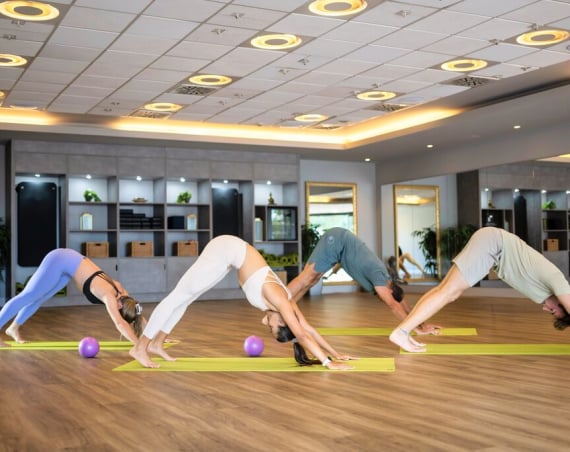Join us on Instagram every Tuesday throughout March as TV presenter, host of the ‘Only Human’ Podcast and talking therapist Jeff Brazier, and former Scottish International and Harlequins rugby player Tim Visser discuss a variety of issues in our new series #StrongMinds.
Each week, Jeff will be sharing his thoughts here to give further information and context to the topics discussed during the session….

Episode Two – Self validation
There is nothing more important than one’s self; it is in constant need of love, care, and attention. However, most people tend to neglect themselves because they don’t understand how important it really is.
The act of self-validation is simply to recognise one’s own worthiness. If it sounds so simple, then why do we do it so little? Is there a part of us that benefits from staying in our current state?
It is common for us to seek validation from external sources. Of course, it feels great when someone says well done. We all remember how good it felt in childhood to be told we were a good boy or girl. Very little changes in adult life.
However, external praise should be in addition to your knowledge of who you are and what you can do. So often it is relied upon as our only source of acknowledgement but waiting for someone else to tell us we are good enough can leave us in a dangerous situation.
I enjoy helping clients recognise what they are giving away to others. It is nothing short of life changing when we start to reclaim our power and create approval for ourselves.
If you know this is something you need to work on, I have 10 tips to improve your relationship with yourself:
1. We are a product of our environment, conditioned to think and feel a certain way about the world and where we fit in it. That is until we find a new awareness and can change our minds. Not every aspect of our life needs to be traced back to an event or aspect of childhood that created the issue or habit, but it is always helpful to recognise that the environment you were raised in will have a large bearing on why you view yourself the way you do. Those thoughts we have about not being good enough are often echoes from past experiences.
By noticing and challenging these opinions you can start to reclaim a sense of self that is based on your own judgement and not a combination of the outlooks of others. We can start to ensure our ‘sense of self’ is based on current reality and not traits that you just accepted are part of ‘who you are’.
Write down your thought process when you catch yourself feeling ‘not good enough’. For each negative thought, write a positive equivalent. If that is too ambitious and feels a little unobtainable right now, find a middle ground. This exercise might look like this:
- You are not good enough to wear those new shoes.
- Those new shows will look great on you, it is why you bought them!
- I’m going to wear those new shoes and see how I feel about them when I take them off.
2. Understanding the inner voice is helpful to rebalancing your relationship with it so that you are in charge. The voice is just there to keep you safe but it’s a bit of an exaggerator and takes the opportunity to warn you off from doing anything new or ‘tough’.
When working on inner voice with clients we often given the voice a name, the sillier the better, so I would like to challenge you to do the same. When you are in dialogue do not forget to refer to it by this name, if you are not already just laughing at it because of the name you have given it you can add a visual layer by imagining what that voice looks like in physical form. This exercise always delivers a powerful way of coming to the same conclusion, that the voice is smaller, less capable and weaker than your positive equivalent. I often ask who would win in a boxing match so it becomes immediately obvious that the limiting voice is no match for the natural source of encouragement that we often overlook. Have a go for yourself, shut your eyes and imagine the characteristics of that moaning, negative object or person and then compare it to how much more appealing the positive object is.
3. Welcome to self-regulation, that thing you’ve been doing all your life. There are lots of healthy examples of how we would go about creating structure and balance by regulating ourselves, there are also ways we can use it to limit and restrict, choosing to return to safety when we perceive something to be risky. We all wish we were fearless in our pursuit of adventure but we have been designed to stay safe since prehistoric times and some of us are a little too good at it. I’m not talking about jumping out of airplanes – rather everyday things that often promise a reward to our sense of self but require us to step foot outside of our comfort zone.
We need to recognise how often we lie to ourselves about what is risky and what isn’t. We also need to ignore our voice so much more! That inner voice has a job, to keep you safe! But it does not want you to ever challenge yourself so exercise some doubt over its validity and make your own choices.
I like to assert some control over my inner voice. He wins sometimes but when I think about the action he’s trying to talk me out of I ask a question back or I think of the benefits, which instantly become more attractive than safety or inaction. A life full of safety and inaction is not the kind of life I want to live, certainly not on account of a set of negative beliefs that I may have picked up over 30 years ago. The thought of being a victim twice, firstly when you weren’t taught to love yourself adequately and then 30 years later when you’re replicating the damage and inflicting it on yourself just doesn’t appeal.
If we don’t want to be restricted by the past, start disagreeing with those familiar themes that go through your mind. Write down your limiting beliefs, challenge them, note down the positive equivalent and spend some time visualising what that version of you looks like, what habits you need in order to keep that version in place.
It’s incredibly useful to experiment with your awareness one day by writing down your thoughts. (Journaling is best, you will get used to me mentioning this so you may as well give in now). In one column list those critical thoughts and in the other any encouraging ones you might happen to have. Does the balance or frequency surprise you? Hopefully it will encourage you to disagree. You wouldn’t let anyone else talk to you like that, so it doesn’t makes sense for it to be ok for you.
4. Recognising your own worthiness can be foreign to us, we see it in others but not ourselves. Everyone has value. We have all contributed to someone’s happiness, security and validation. The failure to see our own might be on account of self-regulation, not allowing ourselves to be too confident, happy or strong in case we lose it. To acknowledge our strengths, our progress, feelings and efforts is a vital component to self-validation and we must make time to see what’s right about us instead of only what’s wrong or in our eyes ‘not good enough’.
I would like you to journal your strengths, your progress and efforts. Keep the page tucked inside the front cover and refer to it whenever you are in a battle with the inner voice. It boils down to trust and this list will make you realise in that you have risen to greater challenges in your time and you will continue to do so. These notes will also be well used as affirmations, positive statements that remind you who you are and what you are. The more we repeat the more we feel validation. Make it a daily practice.
5. How to validate yourself with words. This may require some practice if you are out of the habit. A simple example is telling yourself that ‘It’s normal to feel this way’. Reducing any expectation or pressure you are putting on yourself by asking ‘This is hard. What do I need to cope or feel better?’ We can normalise important trigger points by opting for terms like ‘Everyone makes mistakes, and I gave it my best effort.’
Generally speaking, to acknowledge yourself with comments like ‘I’m proud of myself’, ‘my feelings are valid and I trust my instincts’ are all incredibly powerful. When we are emotional, we can remind ourselves ‘it’s okay to cry’, that ‘I’m more than my accomplishments or failures’ and patiently that ‘I’m making progress.’
When it comes to dealing with someone who is trying to deny us our right to feel or be something, we can remind ourselves that ‘my self-worth is not based on other people’s opinions’ and ‘my feelings matter and I will listen to what they’re telling me.’
As an exercise, write 10 affirmations that are validating and self-confirming in your journal and also write 10 things you like about yourself. If that feels indulgent or arrogant, ignore it, it is just an echo of those limitations we’re moving beyond.
6. Become more assertive and learn to say no. The more passive we are, the more likely we are to conform to the needs and judgements of others. Assertiveness is the ability to turn up with your own opinion, judgement or view and share it in an appropriate manner without the fear of repercussion or belittlement.
I identify with everything I am writing but I’ve worked very hard to overcome my limiting beliefs that stem from my own challenges growing up. You would not easily tell but I have never been one for strong opinions, there was too much risk attached. What if I am wrong? What if I sound stupid? So I played safe for most of my life, almost hiding in plain sight. I am learning to assert myself without fear and I’m enjoying those opinions and the place they come from.
Boundaries are vital for self-validation. They tell you what you are willing to accept and what you are not, whilst also giving the same feedback to those around us. If we didn’t show our children, our boundaries they wouldn’t have as much security because knowing you are in control and regularly practicing the rules you set makes them feel safe.
You probably won’t have assessed your boundaries before now. Have a think what your non-negotiables are, where are your lines drawn? If you haven’t got any let’s put some in, ones that you’re comfortable to introduce and ones that can be reviewed later down the line. If you have trouble thinking of them you can use imagery: imagine yourself building a brick wall between you and certain behaviours. What is the behaviour you are protecting yourself from? What are you protecting anyway? Self-esteem would be a good start.
7. Prioritising you. Sometimes you are only as good as the company you keep. If you keep negative company it will not be long before you are mirroring their energy and behaviours. Before we even get to working on our own thoughts, we can eliminate a large source of undesirable inspiration by cutting off those outside influences that don’t leave us feeling the way we would like or deserve.
You’ve heard of the adage you’re either a drain or a radiator? Well, how many drains do you have in your world? Maybe it is time to re-evaluate those relationships. I am not suggesting we cut off people in need of our support – that’s a fundamental part of friendship. We can manage our time with these energy reducers before we need to step away from them all together, but we have a duty to ensure that we are giving to ourselves as well as others and I want to remind you if our needs are catered for, we can tend to the needs of our friends too.
People ask me if as a coach I feel drained after a few back-to-back sessions, but the truth is I feel energised by the act of adding value. A good question is can I add value to this friend, can I be a part of the solution? If not, then what is your role and what do you get from it?
8. Challenge yourself or forever wonder what might have been. I’m very conscious of regret and how I don’t want to have any when I’m in my rocking chair looking back at my life. Fear will distract you from your hopes and goals. Another way to challenge the concept of safety and the limitations that keep you from experimenting with it is to break the task down into the smallest steps and to make progress so achievable it hardly feels like progress at all.
We often think we have to do something big to unpick a fear, but the most effective approach is to take small gradual steps. What are you scared of doing? What is the littlest thing you can do to step towards that fear? Get that done. Now what is the next thing you can do that represents another small step forward, not sideways but towards your goal?
Don’t fixate on the mountain, focus only on the first step and the next and that’s what gets you there.The trick to achieving goals is the ability to create a process for progress. If you can focus only on the process and trust that the goal will take care of itself you will be able to sustain it and after time and slow and steady progress, you will recognise the good in your achievement.
9. Lower the bar. Setting ourselves up to fail is a common theme and we have all been there. Expectation is another rule that follows us through life but who imposed that rule in the first place? If the rule does not serve us any benefit then we should consign it to the irrelevant pile and replace it with one that is current, relevant and realistic.
Some of us are very driven, we set high expectations and if we don’t conform to the rules we set for ourselves we can be quite critical. Some would say this cycle offers motivation, but I would also say holds us in a perpetual loop of inflexibility and pressure. The more we fail, the more opportunity there is for us to berate ourselves and so for all our efforts we still feel unsatisfied and lack self-validation. If you want to improve your relationship with you, make it easier for yourself to succeed.
What rules do you live by? Let us observe five of them and rate them based on how useful they are to you today. How can you upgrade them? Realistic rules are easy to achieve, more opportunities to win and succeed. Challenging, tricky rules are easy to fall short of, leaving us with the justification to reinforce those limiting beliefs.
10. The school of small wins. Recognising our achievements. When someone asked me a few weeks ago how I celebrate my wins I was taken back to realise that I don’t! I guess I’m always quickly on to the next task, but in doing so I am wasting a perfect opportunity for some self-validation, so this is a great point to end on. Not recognising our achievements is a telltale sign that we may not feel comfortable with congratulations or praise, but if we want to encourage the feeling of success we need to mark each win no matter how small the gesture.
Every time I achieve something, whether that is writing a blog, recording an episode of my podcast, taking on new work or finishing a book, it is cause for celebration. I won’t throw a party, but to raise a glass at dinner is very validating and it shows the children that there is so much value in the small things. These compound over time, these small incremental improvements that I’m encouraging you to make all add up to big changes.
What will you celebrate and how will you celebrate? Please make a list of a few wins you did not mark so we can backdate those and also note a few things that you plan to achieve with the rest of your week. Let’s make celebrating our small wins a regular thing and please share them on social media when you do! Here’s to our small (but significant) wins!
#StrongMinds will run at 8pm every Tuesday evening throughout March on Instagram @DavidLloydUK, or you can catch up via IGTV.
You can read Part 1 of this series here.
Find a club



